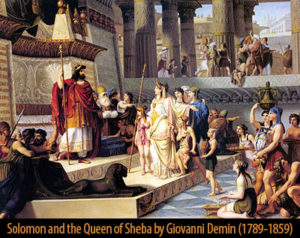I said in my heart, “Come now, I will test you with pleasure; enjoy yourself.” But behold, this also was vanity. I said of laughter, “It is mad,” and of pleasure, “What use is it?” I searched with my heart how to cheer my body with wine–my heart still guiding me with wisdom–and how to lay hold on folly, till I might see what was good for the children of man to do under heaven during the few days of their life. I made great works. I built houses and planted vineyards for myself. I made myself gardens and parks, and planted in them all kinds of fruit trees. I made myself pools from which to water the forest of growing trees. I bought male and female slaves, and had slaves who were born in my house. I had also great possessions of herds and flocks, more than any who had been before me in Jerusalem. I also gathered for myself silver and gold and the treasure of kings and provinces. I got singers, both men and women, and many concubines, the delight of the children of man.
So I became great and surpassed all who were before me in Jerusalem. Also my wisdom remained with me. And whatever my eyes desired I did not keep from them. I kept my heart from no pleasure, for my heart found pleasure in all my toil, and this was my reward for all my toil. Then I considered all that my hands had done and the toil I had expended in doing it, and behold, all was vanity and a striving after wind, and there was nothing to be gained under the sun. -Ecclesiastes 2:1-11
If you come from a strict background of “don’t drink, don’t chew, don’t go with girls who do,” then this passage can be a bit uncomfortable. Solomon communes with his heart and decides to pursue wine (“I searched with my heart how to cheer my body with wine”), women (“many concubines, the delight of the children of man”), and song (“I got singers”). Wine, women, and song apparently have been an issue for a long time! Preacher Solomon would have had a tough time passing muster with most pastor search committees today!
No doubt, this first-glance interpretation looks questionable. But if we stop and consider carefully, we’ll find that there’s a caveat to it. He makes clear that through it all, “my heart [was] still guiding me with wisdom.” He had a purpose in it. No one had the resources he did. He had riches, people, refined tastes, creativity, and favor. He put all this, which is more than the reader will likely ever have, to the test to see if it would bring meaning and joy. His verdict is that it did not and cannot.
The court musicians were probably the best in the world, but when they finished their last note, the room was silent and empty again. He built amazing houses and buildings. Only a fool does not see their emptiness, though. All those buildings are long gone, as are the vineyards, gardens, parks, and orchards. Perhaps someone might protest that all those things are more temporal than silver and gold. Silver and gold are not like agriculture because they last and people are very keen to keep up with them. Solomon “gathered silver and gold and the treasure of kings and provinces.” So, where is it? Where is even a little bit of it? We don’t know. It’s every bit as missing as the vineyards and parks.
It was all a bunch of nothing. “I considered all that my hands had done and the toil I had expended in doing it, and behold, all was [vapor] and [shepherding] wind, and there was nothing to be gained under the sun. If we pursue the same things, we will end up on this road that has been traveled before. The road is a dead end, sometimes without enough room to turn the car around. The verses above are about the search for joy. “I said of laughter, ‘It is mad,’ and of pleasure, ‘What use is it?’”
He repeats in the second paragraph what he said in the first: “my wisdom remained with me.” In other words, he didn’t become a fool temporarily to learn all this. That’s how we can appreciate Ecclesiastes. There’s no place for jealousy in the reader for all he had and did, because it led to suffering, even madness. We should partake of his wisdom. Wisdom literature tells us what life is like even before we choose to experience it. The Lord has made good things for us, things that are meant to be enjoyed. Jesus even turned water into an enormous amount of wine so that the guests could enjoy the party. But the Lord has also cursed these things because every created thing is potentially an idol for someone. These things cannot fulfill us, and that is good, lest we make idols of them.
When we look at the life of Jesus, we see simplicity, non-indulgence, and modesty. Why? Because He is the wisdom of God, knowing the truth about pursing vapors and trying to shepherd the wind under the sun.
Come hear it preached and enacted in the supper with Jesus this Sunday.
